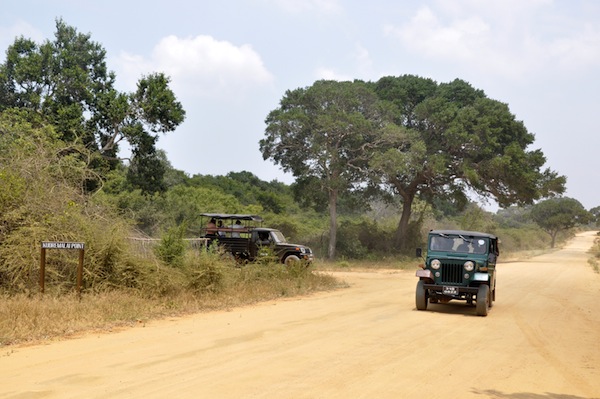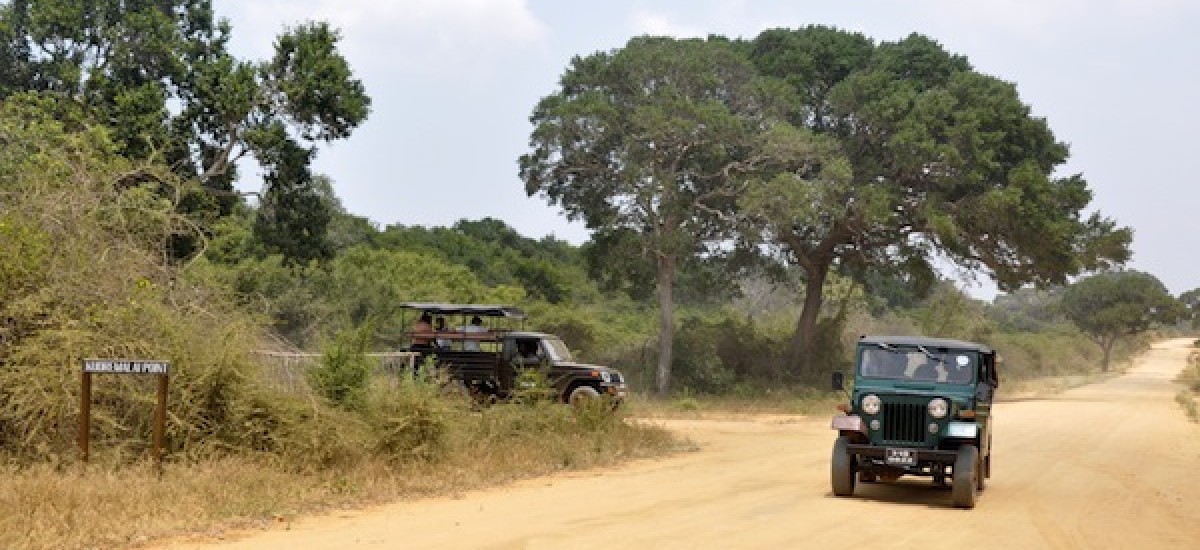
Photo of Mannar-Puttalam road, courtesy Panoramio
Environmentalists have gone to courts demanding that the road connecting Mannar and Puttalam that runs through the Wilpattu National Park be permanently closed. The opening of the old Mannar-Puttalam Road on January 24 2010 was seen as a crucial step in supporting the Northern IDP return process, especially for Muslims displaced from Mannar district. The Southern-most division of Mannar, Musali had the largest concentration of Northern Muslims and was the only Muslim majority division prior to the expulsion in 1990.
This road provides easy and low cost access from Puttalam to Musali in Southern Mannar as opposed to the other route that goes via Medawachchiya, which takes double the time (Puttalam- Medawachchiya – Marichchukadi 235km vs Puttalam – Wilpattu – Marichchukadi – 77km) and triple the cost, from Rs. 320 versus Rs. 100. Saving Rs. 220 per trip means a lot to the IDPs. For this cost, an IDP family struggling to have one meal a day can have an extra meal, especially after the destruction from the recent floods which also affected areas in mainland Mannar.
A women’s group has been accessing the road a few times since the time it was re-opened in January 2010. In a couple of visits, elderly women who had lived in the adjoining villages accompanied the members of the women’s group. These visits have helped us understand the importance of the road, especially from women’s perspectives, since the most impacted population of the road are women and children. Though the temporary closure of this road due to the rain in September 2010 put an end to such visits, the women’s group has sufficient information to demand the mobility right of the IDP women and their families. Some of the narratives and experiences of IDP women are highlighted below:
- It was the Muslims from Musali division in Mannar who started to return to their places of origin (Musali) from Puttalam, where they lived with an IDP status for more than two decades. This was made all the more possible because the Wilpattu road was reopened after about thirty years. The access to their places of origin via this road made it possible for them to return, with the belief that they have mobility between Puttalam and Musali. It was a historical moment for the women to be able to have mobility between the places that they are comfortable to move around and feel safe.
- Basic facilities like water, shelter, toilet, health and education are not available in the resettlement areas, including in the interior of Musali. Pregnant women and women with small children suffered the most to survive when they returned to their places of origins. Hence, return of the entire family is taking longer than expected with some family members, most often the men folk and also some women moving to resettlement areas while keeping their children in Puttalam as the educational facilities in the return areas is still being built up. Thus, the road became a crucial aspect of their lives in order to save the lives of their families and themselves. Spending Rs 220 more on a regular basis is certainly not something that they can afford, especially when their livelihoods have not been restored yet. Travelling by the longer route becomes impossible for a pregnant woman, especially if she is in her early or later months of pregnancy. Her right to mobility is denied with the closure of the road. Another concern is increasing snake-bites since the resettlement areas are infested with snakes and quick access to medical treatment for IDPs has been curtailed.
- Now that women’s mobility has been thwarted by the temporary closure of the road, women have become more dependent on the male members of their families. Women’s safety is once again at risk, given that most male members are away for a good number of days. Their lifestyles are totally destroyed. The traditional norms and gender roles are reinforced, in the form of women staying back at home to look after household work and only men have mobility and access to resources.
- Another aspect that affects the women the most is the unavailability of support structures, such as neighbours and relatives, in the resettled areas. For example, a single woman living with her children in the resettled area, earlier had support from her relatives living in Puttalam. They visited each other frequently when the road was still open. This is not possible anymore and the single women have been pushed, once against, to the most vulnerable category.
Wilpattu Park is a unique habitat for both fauna and flora, and needs to be protected. As people of the area we recognize its value. The destruction to this park has been caused by the armed forces not by the people. There have been new fences coming up and people have been told that such demarcated areas will be given for high-end tourism. It is poor peasants in the area who can monitor and report such land grabbing and abuses of resource. Complete closure of this road will intensify the damage to this natural habitat.
IDP women are not asking for a new highway to be built through the park- they are content to use the existing road. Women support the handing over of the administration of park to relevant wildlife authorities, with IDPs given access. Before the closure of this road in May 1985, people used this road while the guards appointed by the park authority and lately (after the break out of the civil war) military oversaw the use of this road by poor peasants of these areas.
What the northern Muslim IDP women are asking is restricted access like the one they had before. When the road was reopened in January 2010 to facilitate the Muslim IDPs return to Mannar mainland particularly to Musali DS division, there were many restrictions to protect the park (like the road was kept open for the public use only from 6.30am to 3.30pm and the speed limit was restricted to maximum 20km/h and every 100 yards there were navy and military personnel guarding the park standing by the side of the road.
With this, one wonders how the park is exploited or animals are harmed only by the IDPs?
###
The author is a Northern Muslim IDP and an activist.

